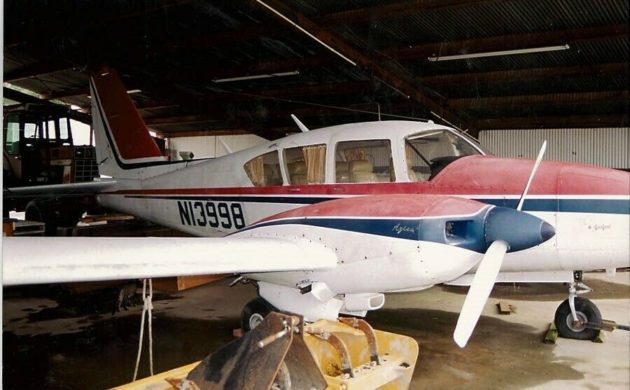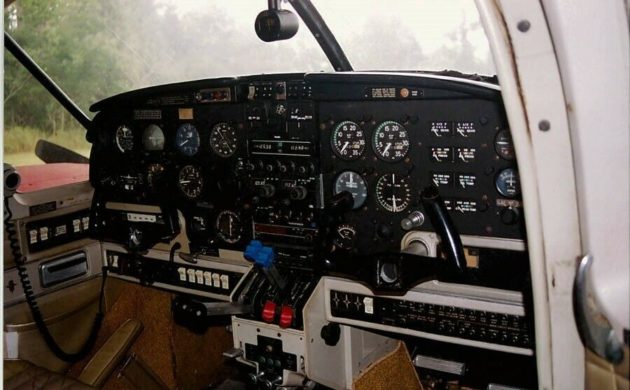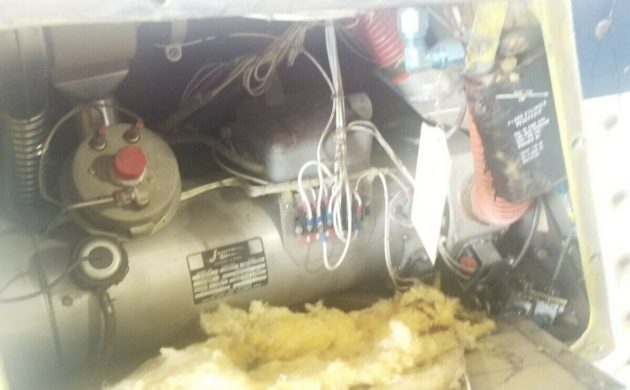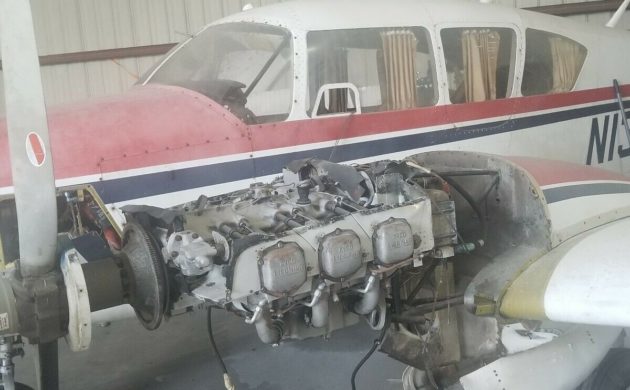This 1971 Piper Aztec is described as a hangar find that had several key upgrades made before going into hibernation in North Carolina. It has since been relocated to Florida, where it’s been refurbished to some degree but may need some further work to be truly air-worthy. The plane is said to have under 2,021 hours from new, and the seller believes it to be one of the lowest-mileage Aztecs available on the market today. This is specifically an Aztec-E model, which is distinguished by a more elongated nose than earlier models, a cosmetic upgrade that actually cost the plane in its useful load rating. Regardless, it looks like a project that deserves completion, and it’s listed here on eBay with bidding at $22,000 and the reserve unmet.
The Piper is currently stored in Palatka, Florida, where it was moved to from the North Carolina facility for re-assembly. The Aztec models came with 250 b.h.p. Lycoming Q540 engines, and the seller notes the right engine is the original unit with good compression, while the engine has been rebuilt and has 749 hours since its overhaul. Those are the details that always spook me about project planes, as how the hell am I going to ever enjoy this thing knowing one engine hasn’t been rebuilt? Regardless, it sounds like the owner intended to get around to it: the seller has listed the plane on his brother’s behalf, whose health is preventing him from continuing on as a pleasure pilot.
Unlike the engines, both props were refurbished before the plane went into storage, and that’s the general underlying theme surrounding this aircraft: lots of work done at different points over the last several years. The prior owner took the plane down to pieces and restored certain components, while the current owner re-assembled the plane and addressed additional maintenance items. Based on the description, the seller is confident that the log books will paint a fuller picture of the upkeep this Piper has benefited from over the years, which fortunately won’t address any need for rust repair: the seller notes, “…Aztecs were zinc chromate painted inside,” and that this example shows no evidence of corrosion.
The aircraft will likely need its cosmetics restored, as the seller notes the need for fresh paint and the front cockpit seats to be reupholstered. The rest of the interior is said to be sound. Whether the engine cover was removed just for photos or is sitting somewhere in the hangar could speak to an overall level of completeness, but the listing does explain that this a “…very good project to make a really great aircraft!” With bidding over $20K and three days left in the auction, it seems likely that there’s more room for this listing to run, and perhaps aviation experts can deduct that much of the heavy lifting is done if the log books confirm the work done to the engines and props. For our readers who spend more time in the air than on the ground, what say you – is this Piper Aztec worth a $30K bid?








I like what I see although a twin engine is a lot more than I could handle today. It was enough of a challenge monitoring just one although a twin still gives you the chance to make it to a place for a safe landing when one engine conks out. I have to admit that I would be somewhat cautious of the one engine still in original condition despite how much the regulations have changed over the years. When I first owned a plane, engine maintenance intervals were done to the hour. Period! Then, they adapted a grace period allowing you to go over the recommended hours providing you had certain things checked over, such as compression and had oil samples sent away for analysis. One of the FAA doctors took advantage of that with his Beechcraft Musketeer and he was flying to an aviators’ annual breakfast when a valve disintegrated, taking out a piston, cylinder head, rod and actually damaged the crankshaft to the point where he decided to replace it. He kept that piston in his office for all to see when everything was back running (flying?) again. You cannot check to see what condition the valves are in unless you dismantle it and check it out. Sure, a compression test and an inspection with a boroscope will give you an idea but it still isn’t the same as getting up close and personal with it. As expensive as it is, I think you’re better off to go the recommended hours, then pull the engine and get it rebuilt. With the exception of my friend’s Super Cub, the results are usually favorable…
I know nothing about small planes, but it seems to me, TWO flat 6 cylinders must give this plane a mighty whallop. I’ve ridden in planes with one 4 cylinder, that struggled to get off the ground. I’d think no problem here. I don’t like how small planes have such tall dashboards, hard to see out. Too bad my father didn’t invent the cell phone,( or whatever) or I’d surely have one of these.
If your father had invented the cell phone, someone else would be flying you around in a private jet complete with hot and cold running stewardesses.
“Is this Heaven?”
“If it were, we’d be eating Pop Tarts with Kim Novak!”
The registered owner is in California. The avionics date to the ‘70’s, it will cost a bunch to get that upgraded.
Agreed. That’s one antiquated stack for US use.
Plus any airworthyness directives that have not been fulfilled since it was put into storage. X2 cuz you know 2 engines. Plus the whole airframe.
If there’s only 2000 hrs on the plane then it must have been outside the whole time. Paint looks terrible.
Sorry the market will know the value of this. Bringing it into compliance will be expensive.
I have owned two Aztecs, the last one was the last year fully optioned series F. I have about 1000 hours pic in these birds. Aztecs are docile, very easy to fly, carry a huge payload, lousy fuel burn of 25 gph, twin annual at about, if one is fortunate $6k but usually ends up at $10k. Twin, retractable, spikes insurance costs. That all said if I wanted a twin again I’d pony up for another Aztec. Not the prettiest on the dance floor, but reliable and easy to fly. In fact, with all but the front seats out we could load a full to the gills with a Chev Suburban size full payload into the Aztruck. I did it multiple times fly across the pond from Chicago to Western Michigan. Twins are out of favor because of said expenses, but if your desire is a twin, buy the best Aztec out there. No one wants them and they are stupid cheap. Most end up in second and third world countries as mine did. I literally gave it away.
https://flightaware.com/resources/registration/N13998
Well I’ll be darned. From how the ownership documents read, the plane is being offered by…..
A flipper.
:-D
Sure looks that way.
In1971-72 I went through airframe and power plant mechanic school at Clover Park Technical School in Lakewood, Washington. While there we completely rebuilt a Piper cub. Those were fun days in my early 20’s, but unfortunately I had developed a drinking problem that led to many failures in life.
God bless America
Not to make light of it, but since this posting is an “Airplane” the first image was that of Ted Striker…
TBO (Time before overhaul) is usually 2000 hours. One engine is now a candidate for this, adding additional expense to a recommission. Hopefully the sale price will be in line with what is to come to make it airworthy. Great airplanes, but a “engine out” can be challenging if the pilot is not well versed in what to expect and how to react.
Aztec’s will not only maintain attitude on one engine but also gain altitude albeit at a slow rate. “Altitude is your friend”
I have about 40 hours in an Aztec E like was said they can haul a load hence the nickname Aztruck. With the twin 250 Lycomings I would say very reliable great engines if flown correctly usually no problem hitting TBO. Now the downside, they are NOT fast, not pretty they go through a LOT of fuel. There were a fair number used for training, I doubt this one was because of the low hours. To get a major done on the timed out engine is going to run around 50k with prop. The radio stack Hmm you could likely use what’s there if in good working condition. Depending on how long it’s been sitting your going to want a very good inspection of the claimed overhauled engine. In summary it’s a very good honest plane it’s everything else all the other systems that are basic but can be expensive to bring up to specs. I do know that Lycoming had an AD 15 years ago for the prop governor and that cost me 5k if that was not fixed here that’s an automatic 10k. To any bidder make sure your as informed as possible and it would make good sense to hire a certified A and P to do the inspection so you know what the needs are before you dig out your wallet!
WELL.. I am very familiar with Aztecs.. If you have about a quarter of a million..you dont know what to do with.. HAVE AT IT.. it would take that…or more to make this Nice..Honestly… I wouldnt know where to start.. There are more AD’s on these planes..than carter has liver pills.. Forget the engines.. they both will need rebuilt..figure 40 grand a piece.. Props.. Figure 8 Grand A piece..Avionics. a mere 40 grand or so minimum..Autopilots run in the 20 grand range..Paint..to strip this.. 20 grand… Interior.. 15 grand.. glass..another ten grand or so..and we havent even started with all of the hoses.. landing gear…brakes..tires..engine mounts..and on..and on…when you get done.. this plane holds 200 gallons of fuel.. on take off..it will burn 50 gallons per hour till you get to altitude..OH..The tanks most likely will need rebuilt as well.. Avgas right now is about 5 bucks a gallon… so figure a grand just to fill it up.. at cruise..you can figure 135 dollars an hour..just for fuel.. You want an expensive headache.. BUY IT…. it wont bring over 80 grand finished..
Well… There is a sobering dose of reality!
So…would you say that aircraft and boats share the two best days in their owners’ lives?
I hate to say it because I am the eternal optimist but the reality of the situation is I doubt that Mike is to far off, airplanes are expensive in every way!
A) If the avionics work, no need to replace. B) Engine overhauls can be negotiated. C) Absent extensive training and practice, losing one engine in a light twin like this means the remaining engine takes you to the scene of the crash. D) New paint isn’t a requirement to become airworthy. E) Ditto the autopilot. F) Check the prices of new aircraft.
KENN.. obviously…you dont know much about airplanes.. You mean to tell me..you would get in IFR conditions with these avionics? why dont you just shoot yourself instead.. they arent even legal..and the transponder most definately isnt legal.. Engine overhauls? Yep.. there are shops out there that will sign off an unairworthy engine.. want to put your family in it? Believe me.. these overhauls..GOOD Overhauls.. will cost you 40 grand apiece.. A new Lycoming Engine..is about 80 grand apiece.. About the light twin..meaning the other engine will just take you to the scene of the crash..WRONG AGAIN.. the Aztec is the only Twin that will actually climb on one engine at gross weight.. NO.. New paint is not required to be airworthy..but why would you spend all of this money to have an ugly airplane.. and the Autopilot? Nope.. its not required..but it sure is nice to have one.. It may just save your Life… as far as a New Aircraft.. well.. Piper doesnt make the aztec anymore.. HOWEVER.. they do make the Seneca.. which by the way.. will not fly far on one engine.. that plane right now.. is right at One Million Dollars.. a little single Engine Piper Archer.. is a half Million.. I have thousands of hours in Pipers.. I know what I am talking about…
Mike’s right on this one. I sold my fully loaded pristine IFR, boots, color radar, Aztec F in 08 for $90k. I’m embarrassed to mention the purchase price 10 years prior. That said we had wonderful adventures in that bird and I do miss it terribly. But never another twin.
I loved to fly; it was one of the most satisfying things I ever did. But expenses got to the point where if I had wanted to continue flying, I would’ve had to give up EVERYTHING else I loved to do. Cars, trucks, bikes, and the parties that ensued. An airplane was way beyond the means of a mechanic, and I found out the hard way; I had to sell my interest in the plane I was involved with. I remember when every third farmer had an airplane. If you were flying and ran into trouble there was always a strip you could put it down. Advance 20 years and hardly a strip exists; the cost of owning and maintaining an airplane went way beyond the average means. And it’s sad…
How hard would it be to transplant one of those Lycomings into a Corvair? Didn’t Tucker use Lycomings?
Tucker used Franklins that had evolved into “Air Cooled Mtrs.” helicopter engines but we’re converted to water cooling, and Cord 810 transmissions!
I believe Tucker used a Franklin engine. And you’d have a Corvair that would resemble some women’s backsides: kind of pear-shaped. Those Lycomings are big…
I don’t think planes are ever sold as lowest “mileage”, but rather lowest total time “hours”. If you buy this because you think it is a deal, you have a huge surprise coming. There is simply no way to put a multi engine, retractable gear, constant speed prop twin back in the air cheaply. Period.
I just came for lame Aztek jokes…..disappointed.
I don,t always agree with Geomechs ,however on his post “I love to fly” ,he is exactly right. I had the same experience. I feel very fortunate that ,I at least got to do the flying I did ,but even in ancient times, the early to mid 70’s, it was very obvious unless, I could get a flying job, my days as a pilot were over.
Yep.
Likely that many found the same end to their time in the pilot’s seat. A great friend managed to maintain membership in a flying club, which group-owned several planes. They were pretty much forced to disband and sell the aircraft in the mid-80’s, as costs escalated beyond the member’s ability to keep the organization afloat.
I flew with my bud several times, it was a really great experience, and he was awesome at the controls. He still feels wistful, and if I ever Lotto’d big, a 4-place plane would be part of a pointed set of expenditures.
At least it’s not Walter White’s Aztec!
OK, I couldn’t resist … retro-cool aircraft here.
Very well put Jay there is an entire world of difference between a single and a twin, folks think just double cost of expenses for a twin and your in. I would say the cost difference between a single and a twin and this includes insc. Maintenance, hanger rent, annual cost and fuel cost I bet I am not far off when I say my Mooney single was around 500.00 per flight hour and the Baron was close to 1800.00 per hour. It’s a startling difference for folks to digest!
Mike: First, I have over 900 hours in a Bellanca Viking, over half in actual IFR conditions, using avionics apparent in this Aztec. 25 years ago, so if, in fact, those avionics aren’t legal it’s a surprise to me. Not preferred maybe, but not legal? If so, my bad.The single engine performance may be there but, as I stated, it takes practice to be able to handle an engine-out situation. Else why do Barons crash when one engine goes? Especially on take-off. “Good” overhauls – by whose standard? My Viking had an expensive, “good” overhaul and then I lost an engine at 10,000 feet over Jacksonville because the two (2) bolts holding the single gear driving both magnetos came out because they hadn’t been safety wired. The reason I mentioned check price of new, to show that even with the costs you propose, the aircraft when finished is less expensive than a new one. Not sure how you misinterpreted that except to continue an abusive rant.
Buying a Bellanca…was your first mistake… what a piece of crappola that plane is..I agree the avionics are legal.. the transponder is NOT…but who would want to fly IFR with this old Junk.. not ME.. a Baron… will not fly far on one Engine.. unless under gross weight.. an Aztec will.. it will fly on one engine until you want to land somewhere… A good overhaul… is by a reputable well known company..not some A and P overhaul on a lonely airport.. if you know what I mean.. as far as your ordeal with your engine.. it can happen to anyone.. Like Me.. I had a Lycoming 180 HP in an Archer… lose oil pressure and the engine was destroyed.. found out the oil pump gears failed..and YES. the AD was done..it was a Mattituck engine by the way with 400 hours on it… and Yes.. I agree…about the Price of a New one.. A new Seneca is in excess of a million dollars today.. dont believe me.. check the price out on line..and yes.. if you want to spend a quarter million on this old bird to bring it up to standards… thats fine.. you will have an excellent airplane… just dont think you are going to sell it and get your money back… it aint happening.. and I dont rant.. after over 40 years of flying.. and owning a used sales business for airplanes for over 25 years…and owning… NOT BROKERING.. and selling well over 1000 airplanes ..and 5000 hours in the air…single..multi..instrument..commercial..and 135 ratings.. I do know what I am talking about..
Used airplane salesman. Used car salesman. Same wonderful reputations.
Figures… coming from Someone who owned one of the worst planes every built…. a Bellanca Dinosaur… nothing but an AD pile of fabric..with a leaking Continental Engine
Boys, boys! Please refill your champagne glasses and take your pi$$ing match elsewhere while the rest of us complain about how expensive it is to rebuild a rusty 1970 Charger…
I would like to disagree on the comment concerning a Bellanca being a piece of junk. They were in fact one of the most efficient singles built during this time the wings were wood and fabric but structurally just as strong as the competitions aluminum wing structure. The big advantage to fabric the flow of air over the wing, no rivets virtually no obvious seams their wings and all control surfaces were smooth as silk which was a key to the planes efficiency. During this time one of their engineers was a fellow named Al Mooney, ever hear of him? My father was also an engineer at Bellanca during this time they built one very good airplane. The only downside to the fabric was they had to be hangered the sun is very hard on that type of surface.